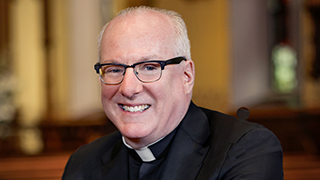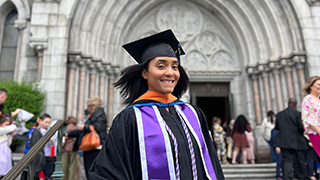Seton Hall Academic Super Stars Ready to Face Off at the Big East Research Symposium - Seton Hall University
Saturday, March 11, 2023
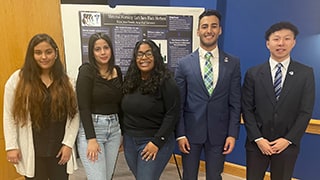
But on Saturday morning, the Garden welcomes another type of talent when it hosts the second annual Big East Undergraduate Research Symposium. Academic superstars from Seton Hall and other schools from the collegiate conference will step up and present their cutting-edge research covering a range of academic areas including spirituality, organic chemistry and public health. While skill and strategy run deep among these Pirates, there will be no foul shots to up end the tournament.
Seton Hall’s team of six undergraduate scholars came together on March 10, the day before the symposium, for a celebratory luncheon hosted by Provost Katia Passerini. With nervous excitement, they shared their research with a supportive group of faculty advisors and administrators. Seton Hall’s bench for the competition includes Chabelly Bonilla, Kiara Jesus-Rosario, Nezar R. Nokrachi, Shreya Rawat, Karen Liu and Jonathan Zhang.
Professor Jose L. Lopez, who along with Professor Sulie Chang, are co-chairs of the Petersheim Academic Exposition and local organizers of the 2023 Big East Undergraduate Research Symposium, explained that the students were selected from last year’s group of Petersheim winners. There are 55 students competing in the symposium this year, representing 11 schools from the Big East. Three scholars will be chosen as winner of the competition on Saturday. Last year, Creighton and Georgetown were the conference winners.
"The research symposium," explained Provost Passerini, "demonstrates that sports can bring us together in many other ways." Passerini, along with her peers from other schools in the Big East conference were charged with finding ways to highlight students achievements outside of athletics. From that inspiration, the research symposium emerged, along with a business pitch and E-Sports competitions.
Big East Scholars
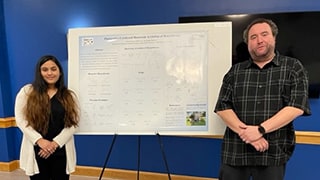
Black maternal health was the subject of an investigation conducted by Kiara Jesus-Rosario, a senior majoring in social work. According to the CDC, Black women are three to four times more likely to experience a pregnancy-related death than white woman. Factors such as disparities in health care, underlying conditions, structural racism and implicit bias are believed to be the cause of higher rates of death among Black women.
In her presentation, entitled Maternal Mortality: Let’s Save Black Mothers! Jesus-Rosario calls on social workers to be "that voice for Black women in America who are unaware of these dangers." She calls on social workers to work with stakeholders to press lawmakers to pass relevant legislation and advocate for greater diversity in healthcare. Jesus-Rosario believes that Black woman are not being heard or seen as decision makers, which is something she is committed to working to correct. The goal, she says, is "spreading awareness of this issue, advocating and mobilizing. And making sure that our legislators know that this is an important issue and that change is needed."
Nezar R. Nokrachi, a recipient of the 2023 Charles B. Rangel Fellowship, takes on the limitless nature of God in his research project, A Survey of Negative Theology: Foundations, The Christian Tradition and a Cross-Cultural Lens. Nokrachi, a senior from Arlington, Massachusetts, majoring in diplomacy and philosophy, explores the idea that it is impossible to put limits on understanding God through language. "Negating anything we say about God is apophatic," he explains, referring to the Greek work for negation. Negative Theology brings together an affirmation "such as God is in everything, but God is not in everything." he explains. The word, "not" he says, makes all the difference in the quest "to understand and return to a state of divinity." In his abstract, Nokrachi writes: "Positive statements alone cannot express the unbounded and absolute attributes of God."
Shreya Rawat, a senior pre-medicine student teamed up with her freshman year roommate, Karen Liu, a biology major, for an organic chemistry project entitled, Photoredox-Catalyzed Meerwein Arylation of Benzofurans. In their research, Rawat and Liu looked at the coupling of an aryldiazonium salt with an alkene. Their strategy offers "an alternative, energy-efficient protocol that proceeds at room temperature without the need for transition metals and strong bases." Attending the symposium preview was Rawat's faculty advisor, Assistant Professor Joseph Badillo, who proudly noted how impressed he was with Rawat's talent in organic chemistry, particularly noteworthy for an undergraduate student who is pursuing biology.
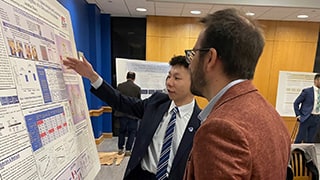
As they practiced and made final adjustments on their presentations before heading to New York City for the evening before the symposium, students shared their excitement about the competition ahead and the sense of pride they have representing Seton Hall in a Big East tournament at Madison Square Garden. "I always try to do my part to represent the University," Nezar Nokrachi shared. "I have the mindset of trying to get others interested and aware of Seton Hall, too."
No matter what the final outcome on Saturday, this group of scholars are undeniably already champions.
Categories: Research





